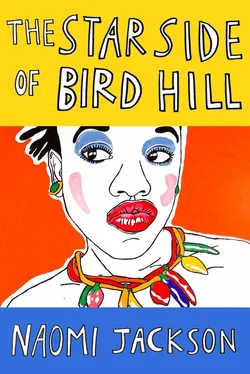Before VBS, Phaedra had not had any dealings with white people other than the ones she saw on television. She wasn’t sure if she could count as white the Hasidic Jews who lived in her neighborhood in Brooklyn, the ones who rushed past her on Shabbat toward their services. These white people who ran the Vacation Bible School were strange, Phaedra thought, but likeable — big, friendly Texans who roasted themselves in the sun and laughed heartily all the time, as if Christ’s glory had a laugh track. Her favorite was her teacher, Tracey Taylor. Phaedra knew from watching television that Ms. Taylor was what some people would call beautiful — blond-haired, blue-eyed, flat-bottomed, and full-breasted. She noticed the way all the men and boys panted after Ms. Taylor, especially her coworker Derrick Boss.
The girls in Phaedra’s age group were flexing their last bits of power before they’d be reduced to first-formers when school started back in September. In Phaedra, they found an easy target. It was the first Friday of the second, monthlong session of VBS, right after praise song, when the barrage of questions started.
“A jumbie comb your hair or what?” Angelique Ward drew attention to the halo of frizz that hovered above Phaedra’s head, the outcome of Phaedra’s tender-headed protest against having her hair cornrowed every week. Dionne was not above chasing Phaedra around the house until she washed her hair and sat down for an hour of oiling her scalp, combing through the knots in her hair, and then braiding it. It was more for Dionne, since she saw Phaedra’s appearance as a reflection on her. But Hyacinth cared about different things, and said that she didn’t want Dionne acting like anybody’s mother, lest she find herself in the family way with some bighead boy’s child.
“I thought they had combs in America,” Simone Saveur added.
“I don’t know where she think she come from with her funny name and her hair flying every which way. What I want to know is who says that light skin and long hair makes you pretty?” Tanya Tompkins pronounced.
The least troublesome of these girls, Donna, was both too round and too timid to join in the teasing. She wore her body like a mistake she hoped to one day be forgiven for. She gestured to Phaedra to follow her inside. Phaedra smashed her fists into her shorts pockets and slid onto one of the church hall’s benches beside Donna.
Donna hunched her shoulders as she devoured four tuna fish sandwiches, washing them down with too-sweet Tang, whose flavor crystals stuck to the corners of her mouth. When she’d taken her last gulp, she let out a burp behind her hand and then she turned to Phaedra. Her eyes darted around the room as if she wanted to be sure that no one heard her secret.
“You know, I have an aunt in Queens. Jamaica, Queens. Is that near where you live?”
“No, I don’t think so,” Phaedra said. She had seen the sign for Jamaica on the taxi ride to JFK earlier that summer. Hearing Donna mention Jamaica, Queens, reminded Phaedra of how confused she’d been when she saw the sign, because the only Jamaica she’d heard of before then was the island Jamaica, and she didn’t think you could drive there.
“Maybe one day when you’re walking around, you’ll see her.”
“Maybe,” Phaedra said. She was hungry. She looked behind her to see that the pyramid of saran-wrapped sandwiches was gone. When Phaedra had first seen the sandwiches, she’d dismissed them, thinking she could wait until she got home to eat the food she knew Hyacinth was cooking. She was starving now.
“I have an idea. We can be friends. We’ll hang out this summer. And then when you’re gone, I’ll write to you.”
Phaedra found it hard to imagine being pleased by running into Donna’s aunt or responding to Donna’s letters. Still, Donna was kinder than any of the other girls had been to her so far. “That would be nice,” she forced herself to say.
Donna offered her second cup of Tang to Phaedra, and she drank it gratefully. She politely declined the bread ends Donna pushed toward her.
Later that afternoon, as they sat cutting pictures of Bible action figures from cardboard, in the same way that the girls had scanned Phaedra for weak spots before pouncing, they pressed the issue of their teacher’s potential beau. Angelique Ward hissed the s in Ms. Taylor’s name until her status as a single woman sounded like a curse. Slowly, because Ms. Taylor had trouble following the rapid-fire patois they spoke, the other girls said how nice she and Derrick looked leading morning prayers together, that they had noticed him looking at her in a way that seemed more than friendly, that his last name, Boss, meant that he would know what to do when the time came.
Phaedra was happy to have the attention drawn away from everything that was wrong with her as they sat talking with the double doors open for breeze. She focused on cutting out a picture of Zacchaeus, the “wee little man” she knew well from praise song, while the other girls weighed in on the possibility of Ms. Taylor’s courtship.
And then Phaedra spoke. “Yes, Ms. Taylor,” she said. “All now, he could be putting his hands up your skirt.”
While the other girls’ expressions shifted from shock to judgment, Angelique Ward walked over to Phaedra with her palms planted firmly on her bony hips. She took a deep breath before spitting her words. “Phaedra Ann Braithwaite, it is only your sister who has made herself known for that kind of slackness.”
Ms. Taylor, for her part, didn’t know what to do with Phaedra’s comment or Angelique’s swift punishment. After an uncomfortable silence during which the word “slackness” hung in the air, she dismissed all the girls except Phaedra. “Phaedra, is there anything you want to talk about?” Ms. Taylor said. She sat down next to Phaedra on the edge of the church hall’s stage, the angle and distance between them perfect for sharing a secret.
“No, ma’am,” Phaedra said. Her face strained with the effort of not crying. There was so much that she wanted to say about her mother and her grandmother and Dionne and Chris. But then she remembered what happened when she told her fourth-grade teacher, Mrs. Friedman, about how her mother would disappear for days and that when she was home she would sit looking out the window or staring at the television screen. The sound of the police sirens when they came to take her mother away came rushing back to Phaedra, piercing the hill’s late-afternoon hush.
“Are you sure?” Ms. Taylor asked.
Phaedra said “No” again with more force. She walked out of the church hall, leaving Ms. Taylor alone amid the paper cutouts and folding chairs.
HYACINTH’S MOTHER liked to say that even though she never learned to read, never went to college to be a nurse or a midwife or a doctor, that didn’t stop her from delivering every baby on the hill. She worked roots for everyone, even for those who said that obeah was backward and against their Christian beliefs, but would still find themselves at her doorstep under cover of darkness, seeking help with a man who suddenly had a hot foot or a taste for another woman’s pot, a womb that wouldn’t bear children, a son or daughter gone to the States or England and never heard from again. Hyacinth went further than her mother in school and knew enough to write and to read the Nation and her Bible. And for her, that was enough. She felt the hill as a magnetic force that pulled her close even when she was outside its bounds. The only safe place to travel was in your dreams, she thought. And despite her daughter spending almost two decades in what Hyacinth referred to alternatively as “foreign,” “up there,” and “that man country,” Hyacinth never stepped foot past Bridgetown. Everything she needed was in her yard.
Читать дальше












